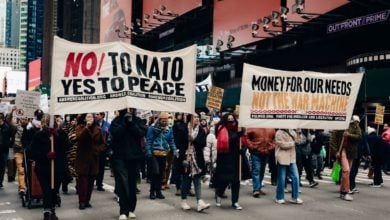Photo: TikTok CEO Shou Zi Chew testifies before a Senate Judiciary Committee hearing. Credit: Screenshot from The Guardian News.
On March 13, the U.S. House of Representatives passed H.R. 7521. This bill, called the “Protecting Americans from Foreign Adversary Controlled Applications Act,” but more commonly known as the TikTok ban, was passed just eight days after its introduction in the House. If the bill passes the Senate, President Joe Biden has said he will sign it.
The bill explicitly targets ByteDance, the owner of popular social media app TikTok, both in its introduction and in its text. If passed, the legislation would force the sale of the app so long as it’s owned by ByteDance, a Beijing-based company. It would also allow for the blocking of applications and websites with more than 1 million monthly active users if the company that makes the app is based in one of four “foreign adversary countries” defined by U.S. law: North Korea, China, Russia and Iran. App stores run by companies like Apple and Google would be prevented from allowing users to download TikTok and other covered apps to users in the United States.
Not a win for data privacy
Some privacy advocates claim this bill is a win for privacy rights, citing concerns about data collection by TIkTok. While some of these concerns may come from a well-intentioned place, they play into racist tropes about surveillance in China. U.S.-based social media apps collect as much or more information than TikTok and use it to create profiles on users in order to target advertisements. These companies also willingly hand over information to U.S. law enforcement and surveillance agencies.
Apple’s App Store added privacy labels to apps in 2020. Facebook’s app lists a massive 17 categories of information under the “Data Used to Track You” and “Data Linked to You” sections, including ominous and vague Sensitive Info and Other Data items.
Data Used to Track You includes information that may be shared directly with other companies including data brokers, while Data Linked to You includes information that is tied to your identity on the app. By comparison, TikTok lists 13 categories of data under these sections, and doesn’t include Sensitive Info, Health & Fitness or Other Data. X, formerly Twitter, similarly has 17 items under the two sections, with many more items listed directly as “Data Used to Track You” than either Facebook or TikTok.
Data privacy is not the real concern of those pushing for a TikTok ban. If it were, they would be focusing on the multi-trillion dollar data collection industry that seeks to monetize every video view, every tap, every reaction GIF, and every message we send as users of these apps. If the U.S. government had real data protection regulations, all apps — including TikTok — would be required to follow them in order to do business in the country.
TikTok is already banned on the work devices of federal employees and of state employees in a majority of states. Donald Trump similarly tried to force the sale of TikTok to U.S. companies in 2020, giving retailer Walmart and enterprise software company Oracle a combined 20% stake in the company. Austin, Texas-based Oracle got its start in 1977 with the Central Intelligence Agency as its first customer, and heavily relies on government contracts for its business. Oracle co-founder and multi-billionaire Larry Ellison called for “a national security database combined with biometrics, thumb prints, hand prints, iris scans or whatever is best…” that could be “built in a few months” in a New York Times opinion piece months after the 9/11 attacks.
The real reasons behind the TikTok ban
The attacks on TikTok must be analyzed in the context of the ongoing effort by the U.S. government to stop China’s ascendance on the global stage as part of its new Cold War efforts. The Obama, Trump and Biden administrations have identified and actively targeted China’s growth in economic, political, technological and diplomatic influence as unacceptable to U.S. interests of global domination and control.
Telecommunications equipment from Chinese companies Huawei, ZTE, Hikvision, Dahua and Hytera were banned by the Biden administration in 2022 in a followup to the Trump-era State Department’s “The Clean Network” initiative to remove Chinese technology from U.S. infrastructure and allied countries at every level, from the massive networking equipment and cables that carry internet traffic around the country and world to the apps on our phones. The 5G and surveillance products sold by most of these companies are not used by everyday people, so these restrictions did not get as much attention as the proposed bans on TikTok.
The 2022 CHIPS and Science Act also targeted China’s technology sector, preventing any company that received some of the billions of dollars in subsidiaries and tax credits funded by the act from selling microprocessor chips that use a process smaller than 28nm. In chip fabrication, a smaller process allows more transistors in a smaller physical area, which can lead to improved performance and energy efficiency. This is particularly important in the development of chips that power artificial intelligence systems, where the United States has lagged behind China.
In total, the Act provides about $280 billion in grants, tax benefits, research funds and subsidies to boost domestic U.S. development of microprocessors and related technology. In response, China has boosted its own domestic microchip production, and Huawei in 2023 announced the Kirin 9000S processor for its phones using a 7nm process. SMIC (Semiconductor Manufacturing International Corporation), a Chinese company, is working towards a 2nm process.
The renewed focus on TikTok also comes at a time when millions of people have continuously mobilized in defense of the Palestinian people since Oct. 7. The genocide in Palestine is being livestreamed for the world to see on TikTok, and young people increasingly get their news from short-form videos on the platform. A recently-leaked audio recording of Jonathan Greenblatt, CEO of the right-wing Zionist organization the Anti-Defamation League, has him admitting, “We really have a TikTok problem, a Gen Z problem” in response to polling that young people in the United States are overwhelmingly opposed to Israel’s actions.
Steven Mnuchin, who served as Treasury Secretary under the Trump administration, has announced his intentions to purchase TikTok and is building a team of investors to put together the money. With a long history in banking, Mnuchin founded Liberty Strategic Investment in 2021. The company has an office in Tel Aviv and in January Mnuchin encouraged investment in Israel during an interview with The Jerusalem Post, saying “Technology opportunities in Israel have always been a big focus of ours.”
U.S.-based social media companies have already shown their willingness to censor pro-Palestinain content. A December report by Human Rights Watch notes that “between October and November 2023, Human Rights Watch documented over 1,050 takedowns and suppressions of content [on] Instagram and Facebook that had been posted by Palestinians and their supporters, including about human rights abuses.” The Palestinian Observatory for Digital Rights Violations reports over 1,100 censorship violations since Oct. 7.
It should also be noted that Silicon Valley represents a major political force in Washington. Along with data privacy regulation, tech giants like Meta, Amazon, Google and Apple have actively lobbied against bills promoting competition in the industry. In fact, Meta — one of TikTok’s prime competitors — is one of the top stocks owned by members of Congress.
TikTok ban only a win for Silicon Valley and its investors
Banning TikTok, or forcing it to be sold to a company based in the United States to continue operating, would have a chilling effect on the ability for people to see what Israel is doing to Palestinians with U.S. political, diplomatic, military and financial support. Such a ban would only be beneficial for U.S. tech giants and their investors, and would serve as a stepping stone in the growing confrontation that the United States is building towards with China.





